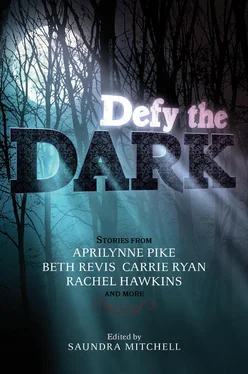Sarah Ockler
The Moth and the Spider
Moths sucked at dying.
Cali had read somewhere that a gypsy moth’s whole purpose in life was to mate. That their entire life span was less than a week, and that as long as the female laid eggs, seven days was considered a good run. Way to go. Mission accomplished.
It didn’t make sense to Cali, but then, at least the creature knew why she was put on this earth. Cheek pressed against the naked, dusty floorboards beneath her bed, Cali was eye level with a moth right now, one she’d seen flitting above her head the night before. Dried up, feet curled in toward its belly.
She hoped the thing had at least accomplished its purpose before it ended up under her bed, and as she mashed the carcass between her thumb and finger, she wondered if God would do the same to her. If at the end of her whole entire life, she’d leave nothing but a silky, silver-white stain on his fingertips.
Doctor Berg would call that a morbid and unhealthy thought, detrimental to the delicate recovery process, but it made Cali smile. That was something, anyway.
Cali blew the remains of the moth across the floor, and the stairs outside her bedroom door groaned. It was definitely her mother—the floorboards didn’t protest otherwise. She never heard anyone else coming or going. Take the baby, for example. By the time she was aware of his presence, he was right there in front of her, messing with her things, chattering endlessly about Elmo or hot dogs or the black-and-white cats next door. This was normal for two-year-olds, Cali’d read, but it didn’t make things any better for Cali.
Maybe if she lay still, she thought tonight, held her breath, her mother would think she’d gone out.
Cali almost smiled, twice in one day. That lying-still trick never worked on anyone.
Her mother knocked four times, hard-hard-soft-soft, then pushed open the door the rest of the way. Cali wasn’t allowed to keep it totally closed, anyway, so the knocking part was just a courtesy her mother thought would show Cali they were starting to trust her again.
Her mother set the tray on Cali’s desk with a clatter, pills hopping around in their opaque orange containers. Hundreds of them. Thousands, maybe millions even. She flicked on the big overhead light and gently tapped Cali’s bedpost with her slippered foot.
“Calista. You’ll catch cold under there.”
“Not possible.” Cali ran her thumb over the ropy half-bracelet scar on her wrist. The ridge was comforting and familiar against the pad of her thumb, as much a part of her now as her wavy brownish hair and naturally straight teeth and the smell of her armpits. “It’s a virus.”
“Out,” her mother said quietly. It was almost a plea. Cali had read about colds and viruses and how germs attack your immune system, and she knew what she was talking about. But apparently her mother didn’t read about that stuff, and now she stood in a cloud of silent disappointment and waited. I could do this all night, her mother would probably say next.
But Cali stayed put and still her mother didn’t say it.
Fine. Cali didn’t feel like playing the game tonight, anyway. She sighed and wormed her way along the floor until her upper body birthed its way out from beneath the footboard, bathed suddenly in harsh yellow light. She propped her head up, elbows on the floor, chin in hands, and watched her mother count three little white pills into a napkin. Under the bed, her legs stretched out behind her, limp. She wasn’t ready to disturb them just yet.
“How are you feeling tonight?” her mother asked. She stirred soup in the plastic bowl, scraping the sides as she went. Steam curled and coiled from the rubber-coated baby spoon like twin serpents.
Cali closed her eyes. After being away for three months, it was easier to talk to her mother that way. “Fine. Better. Soup smells good.”
“Carrot ginger,” her mother said. “Your favorite.”
Was it? Cali nodded, but she couldn’t remember. Maybe her stomach remembered. Dinner was later than usual tonight, and Cali’s insides growled impatiently as she crawled the rest of the way out from under the bed.
“Ready?” her mother said when Cali finally stood and they faced each other. Her mother had spent the last hour reading the baby one bedtime story after another; Cali’d heard it through the wall. She’d cooed about wolves and little pigs and then bears and monsters and fairies, and now she was standing in Cali’s room, offering up the watery, reheated boxed soup and pills as if either could fix anything.
“Ready?” her mother said again.
Cali nodded. She’d been home almost two weeks now, and they were still tiptoeing around each other like strangers. Cali swore her mother sounded different before everything happened, but she couldn’t for the life of her remember how. It was like the old voice had been replaced with this different version, tighter, less confident somehow, slipped in and changed like the locks while she was away. It was normal for everyone else who’d been here for the transition. Just not for Cali.
“Open up,” her mother said after Cali had tossed the pills into her mouth. The part her mother didn’t speak out loud was still there in the tone, just beneath the “I know what’s best for you” surface. Being back home is a privilege. It was granted. It can be taken away.
Cali did as instructed, swallowing hard and then lifting her tongue so her mother could inspect the hidden regions of her mouth. Her mother was short—only reached Cali’s collarbone—so she stretched and tilted her head and scoped out the situation.
“Good girl,” her mother finally said.
The moths that circled Cali’s room heard that a lot.
Cali closed her mouth. She tried to smile, but it felt like a grimace, so she just nodded again and hoped it was enough. Mercifully, her mother left the bowl of soup and a cup of water and waddled out of the bedroom, into the hall, back down the protesting stairs, the pill bottles rattling in her pocket. Cali shut her door as far as she was allowed and jammed her fingers down into her throat, probing the soft flesh until she located the chalky lumps. She’d read about this somewhere, too—maybe on the same encyclopedic site where she’d read about the poor gypsy moths. How to hide the pills behind the bend in her tongue, how to act mellow and even-keeled, to fake the intended results as if she’d been taking them all along.
Good girl .
She listened outside the door again. No one was there. She forced the damp pills through the tiny tear in her mattress into the hole with the others, a hidden cache tucked behind the handle they sewed on to help you flip it when one side started to sag.
A ttention-seeking behavior. That’s what Doctor Berg had called this kind of thing after she’d been at the center for a month. Not a real attempt, he’d told her parents in their first family session, some kind of tough love, let’s-all-face-the-facts-here-shall-we bullshit that was supposed to get Cali to admit her mistakes—because that’s what they were, after all—and kick off the delicate recovery process. Cali had carved a ditch in the worn leather couch with her fingernail and nodded at his wise counsel. Her parents frowned and cocked their heads, watching her cautiously from behind the red rims of their eyes as if she were a poor, dumb animal.
The thing was, Cali wasn’t dumb. She knew you were supposed to cut the long way if you really meant it, to follow the lifeline on your palm, press the blade in at the base of the wrist and slice down hard and deep toward the elbow. She’d gone crossways, though, hoping it would hurt less but still get the job done.
Читать дальше












